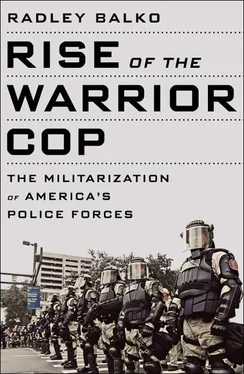As Calvo and Porter were being interrogated, one of Calvo’s own police officers saw the lights and stopped to see what was going on. Berwyn Heights officer Amir Johnson knew this was his mayor’s house, but had no idea what the commotion was about because the Prince George’s County Police Department hadn’t bothered to contact the Berwyn Heights police chief, as they were required to do under a memorandum of understanding between the two agencies. Johnson told the Washington Post that an officer at the scene told him, “The guy in there is crazy. He says he is the mayor of Berwyn Heights.”
Johnson replied, “That is the mayor of Berwyn Heights.”
Johnson then called Berwyn Heights police chief Patrick Murphy. Eventually, Murphy was put in touch with the supervising officer, Det. Sgt. David Martini. Murphy recounted the conversation to the Post: “Martini tells me that when the SWAT team came to the door, the mayor met them at the door, opened it partially, saw who it was, and then tried to slam the door on them,” Murphy recalled. “And that at that point, Martini claimed, they had to force entry, the dogs took aggressive stances, and they were shot.”
If that indeed was what Martini told Murphy, he was either lying or repeating a lie told to him by one of his subordinates. There was never any further mention of Calvo shutting the door on the SWAT team—because it never happened. Calvo later had his dogs autopsied—the trajectories the bullets took through the dogs’ bodies weren’t consistent with the SWAT team’s story.
But the lies, obfuscations, and stonewalling were only beginning.
The police department would first claim that they had obtained a no-knock warrant for the raid. They then backtracked and blamed Calvo’s mother-in-law, arguing that when her scream blew their cover, they were no longer obligated to knock and announce themselves. (This was an interesting theory, given that the knock-and-announce requirement, by definition, would have required them to blow their own cover. That’s the point of the requirement.) Maj. Mark Magaw, commander of the Prince George’s County narcotics enforcement division, claimed that the SWAT team couldn’t have obtained a no-knock warrant if they had wanted to, because the state of Maryland doesn’t allow them. This too was false. The state had passed a bill allowing for no-knock warrants in 2005. 2It’s the sort of law that one would think would have a day-to-day impact on the drug unit of a police department that conducts several raids each week. Yet the head narcotics unit in Prince George’s County was completely ignorant of it. 3Three years later, Magaw would be promoted to Prince George’s County police chief. 4
The affidavit for the search warrant was prepared by Det. Shawn Scarlata. It is incredibly thin. In a few paragraphs, Scarlata relates that he intercepted a FedEx package containing thirty-two pounds of marijuana at one of the company’s warehouses. The package was addressed to Trinity Tomsic at her home address. A police officer disguised as a delivery man then took the package to Calvo’s house, where it was accepted by Georgia Porter. There was also a one-paragraph description of Calvo’s home. That’s the only information in the warrant specific to Calvo and his family. The remainder of the six-page affidavit is a cut-and-paste recitation of Scarlata’s training, qualifications, and assumptions he felt he could make based on his experience as a narcotics officer. As Calvo described the warrant in an online chat, “It talks about all the stuff a drug trafficker should have in his or her home and then says something like, ‘Although we know that the police have no evidence of these things, they can be inferred from the very nature of the charge.’ It is circular reasoning that says because we are suspicious of you, there must be evidence of your guilt.”
On August 7, police arrested a FedEx driver and an accomplice and charged them with various crimes related to drug trafficking. Trinity Tomsic was never supposed to receive that package of marijuana. A drug distributor in Arizona had used her address to get the package into the general Prince George’s County area, at which point an accomplice working for the delivery company was supposed to intercept it. The police had found several similar packages. Worse, county police knew the scheme was going on and knew some packages had been delivered to residences unbeknownst to the people who lived in them. The Washington Post reported a couple of months later on cases in which innocent people had been arrested. “Defense lawyers who practice in the county said authorities appear to arrest and charge anyone who picks up a package containing marijuana without conducting a further investigation,” 5the Post reported. “The more I think about that, the angrier I get,” Calvo later told Post columnist Marc Fisher. “They knew this scheme was going on, yet it never occurred to them from the moment they found out about that package that we were anything but drug dealers.” 6Prince George’s County police chief Melvin High still couldn’t bring himself to rule out the Calvos as suspects, telling the Washington Post , “From all the indications at the moment, they had an unlikely involvement, but we don’t want to draw that definite conclusion at the moment.” 7
Two days later, after the raid had made national and international news, the Prince George’s County Police Department finally cleared Cheye Calvo and his family of any wrongdoing. They did it by way of a press release they put out at 4:30 PM on a Friday, the time and day of the week when bad news is typically buried. It also happened to be the night of the opening ceremonies for the 2008 Summer Olympics in Beijing. 8
Perhaps even more baffling, officials continued to insist that the raid shouldn’t have happened any other way. Even as they acknowledged that Calvo and his family were innocent, in the months and years following the raid they would repeat again and again that not a single officer did anything wrong, and that no one had any reason for remorse. In 2010 Sheriff Michael Jackson was asked during his campaign for Prince George’s County executive if he had any regrets about the raid. His response: “Quite frankly, we’d do it again. Tonight.” Even when Chief High called Calvo to tell him that he had been cleared of any criminal suspicion, High made sure to explicitly tell the mayor that the call should not be interpreted as an apology. The statements from county officials over the next several months were also astonishingly callous. A day after he called Calvo, High told the press that the raiding cops showed “restraint and compassion” and insisted that they should be credited for not arresting Calvo or members of his family. (The only incriminating evidence found in the home was the unopened box of marijuana that the deputies themselves had delivered.) 9Months later, Prince George’s County executive Jack Johnson said something even more preposterous. He insisted that once Prince George’s County police agencies had cleared themselves, that was the only apology necessary—and in fact that they deserved praise for clearing Calvo’s name after nearly killing him. “Well, I think in America that is the apology, when we’re cleared,” Johnson said. “At the end of the day, the investigation showed [Calvo] was not involved. And that’s, you know, a pat on the back for everybody involved, I think.” 10On September 8, about five weeks after the raid, Sheriff Jackson’s office announced that his internal investigation had cleared his deputies of any wrongdoing. Everything was done according to procedure. Or, as Jackson put it, “the guys did what they were supposed to do.” 11Nine months later, Jackson’s office would conclude another investigation, again clearing his deputies. Neither outcome was surprising, given that Jackson had been defending his deputies since the night of the raid. It’s probably also worth noting that the father of Det. Shawn Scarlata—the officer who initiated the investigation leading to the raid—was on the internal affairs team that conducted the investigations.
Читать дальше












